完整版虚拟语气用法总结超好
(完整版)英语虚拟语气语法归纳总结
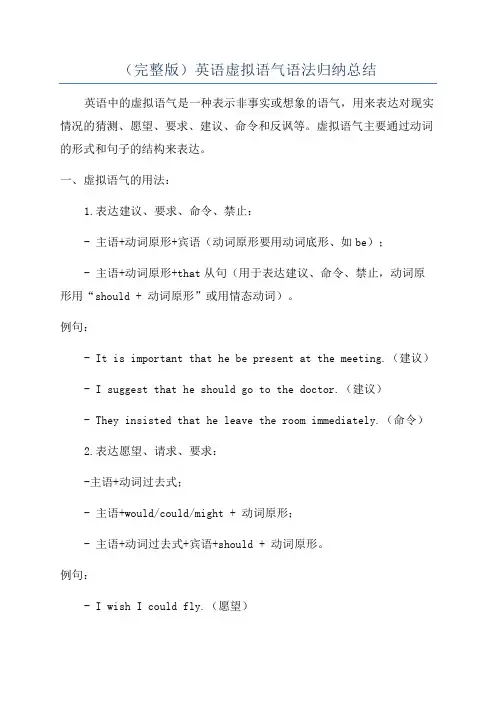
(完整版)英语虚拟语气语法归纳总结英语中的虚拟语气是一种表示非事实或想象的语气,用来表达对现实情况的猜测、愿望、要求、建议、命令和反讽等。
虚拟语气主要通过动词的形式和句子的结构来表达。
一、虚拟语气的用法:1.表达建议、要求、命令、禁止:- 主语+动词原形+宾语(动词原形要用动词底形、如be);- 主语+动词原形+that从句(用于表达建议、命令、禁止,动词原形用“should + 动词原形”或用情态动词)。
例句:- It is important that he be present at the meeting.(建议)- I suggest that he should go to the doctor.(建议)- They insisted that he leave the room immediately.(命令)2.表达愿望、请求、要求:-主语+动词过去式;- 主语+would/could/might + 动词原形;- 主语+动词过去式+宾语+should + 动词原形。
例句:- I wish I could fly.(愿望)- I would appreciate it if you could help me.(请求)3.表示虚拟条件:- If条件从句中的谓语动词用过去完成时,主句用would/should/might/could + have + 过去分词;- If条件从句中的谓语动词用过去时,主句用would/should/could + 动词原形。
例句:- If I had known his phone number, I would have called him.(虚拟条件)- If you had listened to me, we could have finished the project earlier.(虚拟条件)4.表达建议、要求、祝愿:- If only内部称述 + 主语 + 过去式。
虚拟语气的用法归纳
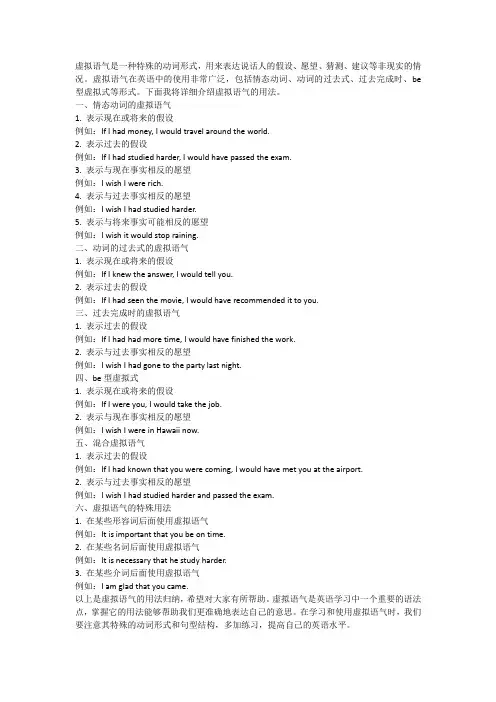
虚拟语气是一种特殊的动词形式,用来表达说话人的假设、愿望、猜测、建议等非现实的情况。
虚拟语气在英语中的使用非常广泛,包括情态动词、动词的过去式、过去完成时、be 型虚拟式等形式。
下面我将详细介绍虚拟语气的用法。
一、情态动词的虚拟语气1. 表示现在或将来的假设例如:If I had money, I would travel around the world.2. 表示过去的假设例如:If I had studied harder, I would have passed the exam.3. 表示与现在事实相反的愿望例如:I wish I were rich.4. 表示与过去事实相反的愿望例如:I wish I had studied harder.5. 表示与将来事实可能相反的愿望例如:I wish it would stop raining.二、动词的过去式的虚拟语气1. 表示现在或将来的假设例如:If I knew the answer, I would tell you.2. 表示过去的假设例如:If I had seen the movie, I would have recommended it to you.三、过去完成时的虚拟语气1. 表示过去的假设例如:If I had had more time, I would have finished the work.2. 表示与过去事实相反的愿望例如:I wish I had gone to the party last night.四、be型虚拟式1. 表示现在或将来的假设例如:If I were you, I would take the job.2. 表示与现在事实相反的愿望例如:I wish I were in Hawaii now.五、混合虚拟语气1. 表示过去的假设例如:If I had known that you were coming, I would have met you at the airport.2. 表示与过去事实相反的愿望例如:I wish I had studied harder and passed the exam.六、虚拟语气的特殊用法1. 在某些形容词后面使用虚拟语气例如:It is important that you be on time.2. 在某些名词后面使用虚拟语气例如:It is necessary that he study harder.3. 在某些介词后面使用虚拟语气例如:I am glad that you came.以上是虚拟语气的用法归纳,希望对大家有所帮助。
虚拟语气用法总结(超好)
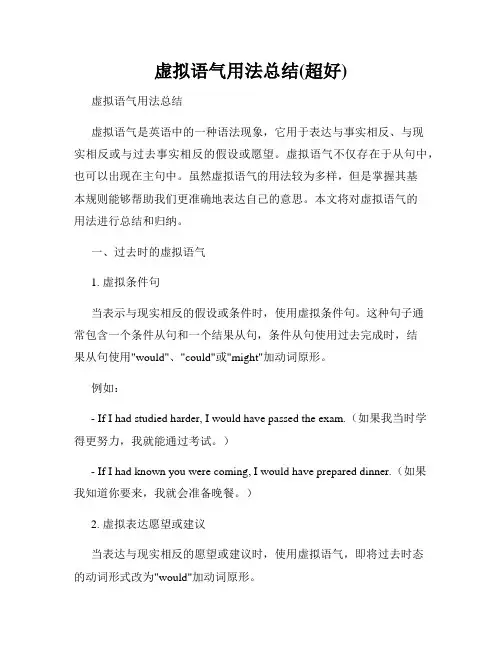
虚拟语气用法总结(超好)虚拟语气用法总结虚拟语气是英语中的一种语法现象,它用于表达与事实相反、与现实相反或与过去事实相反的假设或愿望。
虚拟语气不仅存在于从句中,也可以出现在主句中。
虽然虚拟语气的用法较为多样,但是掌握其基本规则能够帮助我们更准确地表达自己的意思。
本文将对虚拟语气的用法进行总结和归纳。
一、过去时的虚拟语气1. 虚拟条件句当表示与现实相反的假设或条件时,使用虚拟条件句。
这种句子通常包含一个条件从句和一个结果从句,条件从句使用过去完成时,结果从句使用"would"、"could"或"might"加动词原形。
例如:- If I had studied harder, I would have passed the exam.(如果我当时学得更努力,我就能通过考试。
)- If I had known you were coming, I would have prepared dinner.(如果我知道你要来,我就会准备晚餐。
)2. 虚拟表达愿望或建议当表达与现实相反的愿望或建议时,使用虚拟语气,即将过去时态的动词形式改为"would"加动词原形。
例如:- I wish I were taller.(我希望我更高。
)- She suggested that he take a bus.(她建议他坐公交车。
)二、现在时的虚拟语气1. 虚拟条件句与过去时的虚拟条件句类似,现在时的虚拟条件句也包含一个条件从句和一个结果从句。
条件从句使用"were to"结构或"should"加动词原形,结果从句使用"would"、"could"或"might"加动词原形。
例如:- If I were to win the lottery, I would travel the world.(如果我中了彩票,我会周游世界。
虚拟语气的用法总结
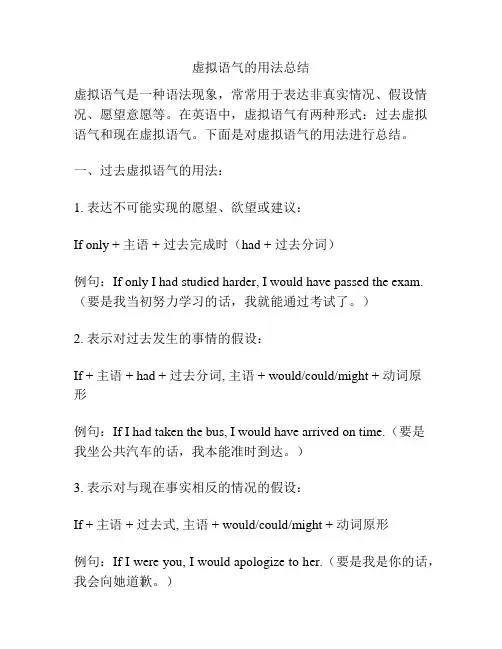
虚拟语气的用法总结虚拟语气是一种语法现象,常常用于表达非真实情况、假设情况、愿望意愿等。
在英语中,虚拟语气有两种形式:过去虚拟语气和现在虚拟语气。
下面是对虚拟语气的用法进行总结。
一、过去虚拟语气的用法:1. 表达不可能实现的愿望、欲望或建议:If only + 主语 + 过去完成时(had + 过去分词)例句:If only I had studied harder, I would have passed the exam.(要是我当初努力学习的话,我就能通过考试了。
)2. 表示对过去发生的事情的假设:If + 主语 + had + 过去分词, 主语 + would/could/might + 动词原形例句:If I had taken the bus, I would have arrived on time.(要是我坐公共汽车的话,我本能准时到达。
)3. 表示对与现在事实相反的情况的假设:If + 主语 + 过去式, 主语 + would/could/might + 动词原形例句:If I were you, I would apologize to her.(要是我是你的话,我会向她道歉。
)4. 表达对不可能实现的条件:If only + 过去式例句:If only I had a million dollars.(要是我有一百万美元该多好。
)二、现在虚拟语气的用法:1. 表达建议、命令等正式用法:表达建议:(should +动词原形/动词原形)例句:It's important (that) you should take some rest.(你应该休息一下,这很重要。
)表达命令:(应用“命令式”的虚拟形式)例句:It's vital (that) he be here on time.(他必须准时到达,这很重要。
)2. 表达愿望、要求、建议等陈述式的用法:It's time/It's high time + 过去式例句:It's time you went to bed.(你该去睡觉了,时间到了。
完整版)虚拟语气用法归纳
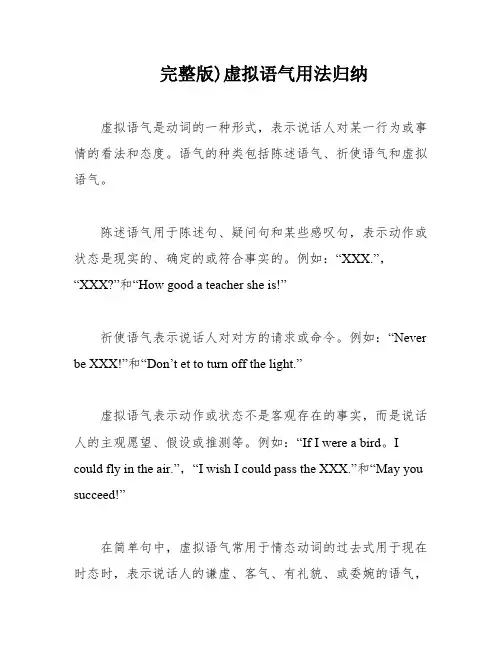
完整版)虚拟语气用法归纳虚拟语气是动词的一种形式,表示说话人对某一行为或事情的看法和态度。
语气的种类包括陈述语气、祈使语气和虚拟语气。
陈述语气用于陈述句、疑问句和某些感叹句,表示动作或状态是现实的、确定的或符合事实的。
例如:“XXX.”,“XXX?”和“How good a teacher she is!”祈使语气表示说话人对对方的请求或命令。
例如:“Never be XXX!”和“Don’t et to turn off the light.”虚拟语气表示动作或状态不是客观存在的事实,而是说话人的主观愿望、假设或推测等。
例如:“If I were a bird。
I could fly in the air.”,“I wish I could pass the XXX.”和“May you succeed!”在简单句中,虚拟语气常用于情态动词的过去式用于现在时态时,表示说话人的谦虚、客气、有礼貌、或委婉的语气,常用于日常会话中。
例如:“XXX to show me the way to the post office?”和“It would be better for you not to stay up too late.”虚拟语气还可以用于表达祝愿,常用“may+动词原形”表示。
例如:“May good luck be yours!”,“May you be happy!”和“May you do even better!”。
还可以用于表达愿望和建议。
例如:“If only XXX.”和“XXX.”如果我现在有时间,我会和他们一起去。
(陈述语气)如果我现在是你,我就会和他们一起去。
(虚拟语气)与过去事实相反:若与过去事实相反,条件从句的谓语用过去完成时(be动词用had been),主句谓语用“should (would。
could。
might)+have+过去分词”。
如:如果我昨天有时间,我就和他们一起去了。
虚拟语气英语知识点总结
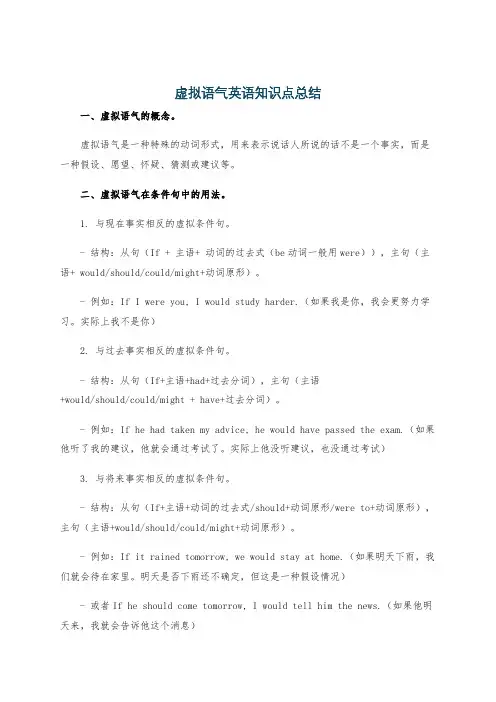
虚拟语气英语知识点总结一、虚拟语气的概念。
虚拟语气是一种特殊的动词形式,用来表示说话人所说的话不是一个事实,而是一种假设、愿望、怀疑、猜测或建议等。
二、虚拟语气在条件句中的用法。
1. 与现在事实相反的虚拟条件句。
- 结构:从句(If + 主语+ 动词的过去式(be动词一般用were)),主句(主语+ would/should/could/might+动词原形)。
- 例如:If I were you, I would study harder.(如果我是你,我会更努力学习。
实际上我不是你)2. 与过去事实相反的虚拟条件句。
- 结构:从句(If+主语+had+过去分词),主句(主语+would/should/could/might + have+过去分词)。
- 例如:If he had taken my advice, he would have passed the exam.(如果他听了我的建议,他就会通过考试了。
实际上他没听建议,也没通过考试)3. 与将来事实相反的虚拟条件句。
- 结构:从句(If+主语+动词的过去式/should+动词原形/were to+动词原形),主句(主语+would/should/could/might+动词原形)。
- 例如:If it rained tomorrow, we would stay at home.(如果明天下雨,我们就会待在家里。
明天是否下雨还不确定,但这是一种假设情况)- 或者If he should come tomorrow, I would tell him the news.(如果他明天来,我就会告诉他这个消息)- 以及If I were to see her tomorrow, I would give her the book.(如果我明天见到她,我就会把书给她)三、虚拟语气在宾语从句中的用法。
1. wish后的宾语从句。
- 表示与现在事实相反的愿望,从句谓语动词用过去式(be动词用were)。
虚拟语气的用法归纳
虚拟语气的用法归纳关键信息项:1、虚拟语气在条件状语从句中的用法2、虚拟语气在宾语从句中的用法3、虚拟语气在主语从句中的用法4、虚拟语气在表语从句和同位语从句中的用法5、虚拟语气在定语从句中的用法6、虚拟语气在状语从句中的其他用法7、虚拟语气在一些特殊句型中的用法11 虚拟语气在条件状语从句中的用法111 与现在事实相反若表示与现在事实相反,条件从句的谓语用过去式(be 动词通常用were),主句谓语用“should / would / could / might +动词原形”。
例如:If I were you, I would take his advice (如果我是你,我会接受他的建议。
)112 与过去事实相反若表示与过去事实相反,条件从句的谓语用过去完成式(had +过去分词),主句谓语用“should / would / could / might + have +过去分词”。
比如:If you had come earlier, you would have caught the bus (如果你早点来,你就赶上公交车了。
)113 与将来事实相反若表示与将来事实相反,条件从句的谓语有三种形式:过去式(be 动词通常用 were)should +动词原形were to +动词原形主句谓语用“should / would / could / might +动词原形”。
例如:If it were to rain tomorrow, we would stay at home (如果明天下雨,我们就待在家里。
)12 虚拟语气在宾语从句中的用法121 wish 后的宾语从句wish 后的宾语从句要用虚拟语气。
与现在事实相反,用一般过去时;与过去事实相反,用过去完成时;与将来事实相反,用“would / could +动词原形”。
例如:I wish I were as tall as you (我希望和你一样高。
最全虚拟语气用法总结-202X年学习资料
千里之行,始于足下。
最全虚拟语气用法总结-202X年学习资料
虚拟语气是表示假设、愿望、建议、命令等非事实的情况的一种语气形式。
下面是对虚拟语气用法的总结:
1.表示假设:
- 表示与现在事实相反的假设:
- 与过去事实相反:If + 过去完成时,主句使用 would/could/might + have + 过去分词。
- 与现在事实相反:If + 过去时,主句使用 would/could/might + 动
词原形。
- 与将来事实相反:If + 过去时,主句使用 would/could/might + 动
词原形。
- 表示将来事实的虚拟:
- If + 一般现在时,主句使用 will/would/may/might/can/could + 动词原形。
2.表示愿望、建议和要求:
- 愿望:
- I wish + (that) + 从句(过去时)。
- If only + 从句(过去时)。
- 建议和要求:
- 动词原形 + that + 主语 + (should) + 动词原形。
第1页/共2页
锲而不舍,金石可镂。
3.表示命令和建议:
- 命令:
- 动词原形 + that + 主语 + 动词原形。
- 建议:
- It is (high) time + 过去式 + (that) + 主语 + 过去式。
以上是对虚拟语气用法的简要总结。
在实际运用中,需要根据具体情况选择适当的虚拟语气形式来表达所需的意思。
英语虚拟语气的基本用法归纳(优秀9篇)
英语虚拟语气的基本用法归纳(优秀9篇)虚拟语气的时态篇一一、过去式:if 从句:had done英语语法:虚拟语气的时态主句:情态动词(would,could,might,should)+have done英语语法:虚拟语气的时态二、现在式:if 从句:did/were英语语法:虚拟语气的时态主句:情态动词(would,could,might,should)+do英语语法:虚拟语气的时态三、将来时:if 从句:①should/shall do②were to do③did/were英语语法:虚拟语气的时态6主句:情态动词(would,could,might,should)+do虚拟语气专项练习题解析篇二1.I enjoyed the movie very much. I wish I _____ the book from which it was made.A. have readB. had readC. should have readD. are reading2.You are late. If you _____ a few minutes earlier, you _____ him.A. come; would meetB. had come; would have metC. come; will meetD. had come; would meet3.The two students talked as if they _____ friends for years.A. should beB. would beC. have beenD. had been4.It is important that I _____ with Mr. Williams immediately.A. speakB. spokeC. will speakD. to speak5.He looked as if he _____ ill for a long time.A. wasB. WereC. has beenD. had been6.If the doctor had come earlier, the poor child would not _____.A. have laid there for two hoursB. have been lied there for two hoursC. have lied there for two hoursD. have lain there for two hours7.I wish that I _____ with you last night.A. wentB. could goC. have goneD. could have gone8.Let’s say you could go there again, how _____ feel?A. will youB. should youC. would youD. do you9.I can’t stand him. He always talks as though he _____ everything.A. knewB. knowsC. has knownD. had known10._____ the fog, we should have reached our school.A. Because ofB. In spite ofC. In case ofD. But for11.If you had told me in advance, I _____ him at the airport.A. would meetB. would had metC. would have metD. would have meet12.Mike can take his car apart and put it back together again. I certainly wish he_____ me how.A. teachesB. will teachC. has taughtD. would teach13.I would have told him the answer, had it been possible, but I _____ so busy then.A. had beenB. wereC. wasD. would be14.He’s working hard for fear that he _____.A. should fall behindB. fell behindC. may fall behindD. would fallen behind15.If it _____ another ten minutes, the game would have been called off.A. had rainedB. would have rainedC. have seenD. rained16.He suggested that they _____ use a trick instead of fighting.A. shouldB. wouldC. doD. had17.My father did not go to New York; the doctor suggested that he _____ there.A. not wentB. won’t goC. not goD. not to go18.I would have gone to the meeting if I _____ time.A. had hadB. have hadC. hadD. would have had19.Would you rather I _____ buying a new bike?A. decided againstB. will decide againstC. have decidedD. shall decide against20.You look so tired tonight. It is time you _____.A. go to sleepB. went to sleepC. go to bedD. went to bed21、—Why didn’t you buy a new car?—I would have bought one if I _____ enough money.A. hadB. have hadC. would haveD. had had22.If she could sew, _____.A. she make a dressB. she would have made a shirtC. she will make a shirtD. she would had made a coat23._____ today, he would get there by Friday.A. Would he leaveB. Was he leavingC. Were he to leaveD. If he leaves24.His doctor suggested that he _____ a short trip abroad.A. will takeB. would takeC. takeD. took25.The Bakers arrived last night. If they’d only let us know earlier,_____ at the station.A. we’d meet themB. we’ll meet themC. we’d have met themD. we’ve met them26.If I _____ you, I _____ more attention to English idioms and phrases.A. was; shall payB. am; will payC. would be; would payD. were; would pay27.We might have failed if you _____ us a helping hand.A. have not givenB. would not giveC. had not givenD. did not give28.The law requires that everyone _____ his car checked at least once a year.A. hasB. hadC. haveD. will have29.It is strange that he _____ so.A. would sayB. would speakC. should sayD. will speak30.Had I known her name, _____A. or does she know mine?B. and where does she live?C. she would be beautiful.D. I would have invited her to lunch.31.He has just arrived, but he talks as if he _____ all about that.A. knowB. knowsC. knownD. knew32.If I _____ the money, I would have bought a much bigger car.A. possessedB. ownedC. hadD. had had33.He was very busy yesterday; otherwise, he _____ to the meeting.A. would comeB. cameC. would have comeD. will come34.The librarian insists that John _____ no more books from the library before he returns all the books he has borrowed.A. will takeB. tookC. takeD. takes35.I left very early last night, but I wish I _____ so early.A. didn’t leaveB. hadn’t leftC. haven’t leftD. couldn’t leave36.I do not have a job. I would find one but I _____ no time.A. hadB. didn’t haveC. had hadD. have37.I wish that you _____ such a bad headache because I’m sure that you would have enjoyed the concert.A. hadn’tB. didn’t have hadC. hadn’t hadD. hadn’t have38.He insisted that we all _____ in his office at one o’clock.A. beB. to beC. would beD. shall be39.Helen couldn’t go to France after all. That’s too bad. I’m sure she would have enjoyed it if _____.A. she’s goneB. she’ll goC. she’d goneD. she’d go答案:1—5 BBDAD 6—10 DDCAD11—15 CDCAA 16—20 ACAAD21—25 DBCCC 26—30 DCCCD31—35 DDCCB 36—39 DCAC解析:1.wish后面用虚拟语气,表示与过去事实相反用过去完成时。
虚拟语气用法总结(完整)
虚拟语气用法总结(完整)if+主语+had+过去分词+其他+主语+should/would/could/might+have+过去分词+其他例:1.XXX,XXX如果我知道你要来,我就会准备些食物的。
(事实:我不知道)2.XXX,XXX.如果我当时研究更努力些,我就能通过考试了。
(事实:我没有用功研究)3、表示与将来事实相反的情况:if+主语+were/should+动词原形+其他+主语+would/could/might+动词原形+其他例:1.IfIwereyou,XXX.如果我是你,我不会那样做。
(将来:我不可能成为你)2.XXX,XXX.如果下雨了,带上这把伞。
(将来:不一定会下雨)1.If I had arrived earlier。
I would have been able to meet her。
(Fact: I arrived late)2.If he had XXX my advice。
he would not have made such a mistake。
(Fact: He didn't listen to me)3.If he were to come here tomorrow。
I would talk to him。
(Fact: It's XXX he will come)In expressing ns。
orders。
requests。
etc。
the subjunctive mood is often used in the object clause。
with the verb in the form of "should + infinitive," which can be omitted.Other uses of XXX:1.The subjunctive mood is used in the object clause after "wish" to express a XXX fact。
- 1、下载文档前请自行甄别文档内容的完整性,平台不提供额外的编辑、内容补充、找答案等附加服务。
- 2、"仅部分预览"的文档,不可在线预览部分如存在完整性等问题,可反馈申请退款(可完整预览的文档不适用该条件!)。
- 3、如文档侵犯您的权益,请联系客服反馈,我们会尽快为您处理(人工客服工作时间:9:00-18:30)。
与将来事实相 反的假设
过去式(be--were) should / would/
should do
could / might + do
were to do
1.如果我是你,我会接受他的建议(现在虚拟) If I were you, I would accept his advice.
2.如果明天下雨,我会待在家里。(将来虚拟)
A.Were
B. Should
C.Would
D. Will
If it should rain tomorrow (省略if,用部分倒装)
2.错综时间虚拟语气
当从句与主句时间不一致时,动词的形式要根 据它所表示的时间作出相应的调整。
If you __ha_d__fo_ll_ow_e_d___(follow)my advice just now, you __w_o_u_ld_b_e__(be)better now.
Should it rain tomorrow,…….
3.If you had studied hard before, you would have passed the exam. Had you studied hard before,……
________ it rain tomorrow, we would have to put off the visit to the Yang Pu Bridge.
He hesitated for a moment before kicking the ball, otherwise he _____ a goal.
A.had scored B.scored C.would score D.would have scored
1.I was ill that day. Otherwise, I would have taken part in the sports meeting.
=If I hadn't been ill that day, I would have taken part in the sports meeting.
Without electricity, human being life ______ quite different today.
A.is B.will be C.would have been D.would be
But for his help, I ______. A.should not have succeeded B.have not succeeded C.did not succeed D.had not succeeded
Байду номын сангаас
2.He telephoned to inform me of your birthday, or I would have known nothing about it.
3.Without / But for your help, we couldn' t have finished the work ahead of time. =If it had not been for your help, …
1. if从句中, 省略if,were,had,should可以放在句 首,(用于倒装结构), 否定词not不能放在前面。
1.If I were you, I would accept his advice. Were I you,……
2.If it should rain tomorrow, I would stay at home.
虚拟语气
概念:
虚拟语气:表示说话人所说的不是事实, 而是一种愿望、假设、或推测。
一、虚拟语气在 if非真实条件句中
虚拟条件 从句(If)
主句
与现在事实相 反的假设
过去式 be --were
should / would/ could / might + do
与过去事实相 反的假设
had done
should / would/ could / might + have done
If you __h_a_d_s_tu_d_ie_d_(study)hard before, you _w_o_u_ld_b_e_(be)a college student now.
If you ______ with George earlier, you _____ so angry now.
If it rained(should rain/were to rain )tomorrow, I would stay at home. 3.如果你以前好好学习, 你会通过考试的。 If you had studied hard before, you would have passed the exam. (过去虚拟)
A.talked; would not be B.had talked; would not be C.would talk; would not be D.had talked; would not have been
If we had taken such effective measures much earlier, the river _____ so seriously now.
You didn' t let me drive. If we ______ in turn, you ______ so tired.
A.drove; didn' t get B.drove; wouldn' t get C.were driving; wouldn' t get D.had driven; wouldn' t have got
A.is not polluted
B.would not be polluted
C.had not been polluted
D.would not have been polluted
3、含蓄虚拟语气 在虚拟语气中,并不总是出现if引导的条件句, 而通过其它手段来代替条件句。 常用的有otherwise ,or ,without,but for(倘没 有,要不是)等。
